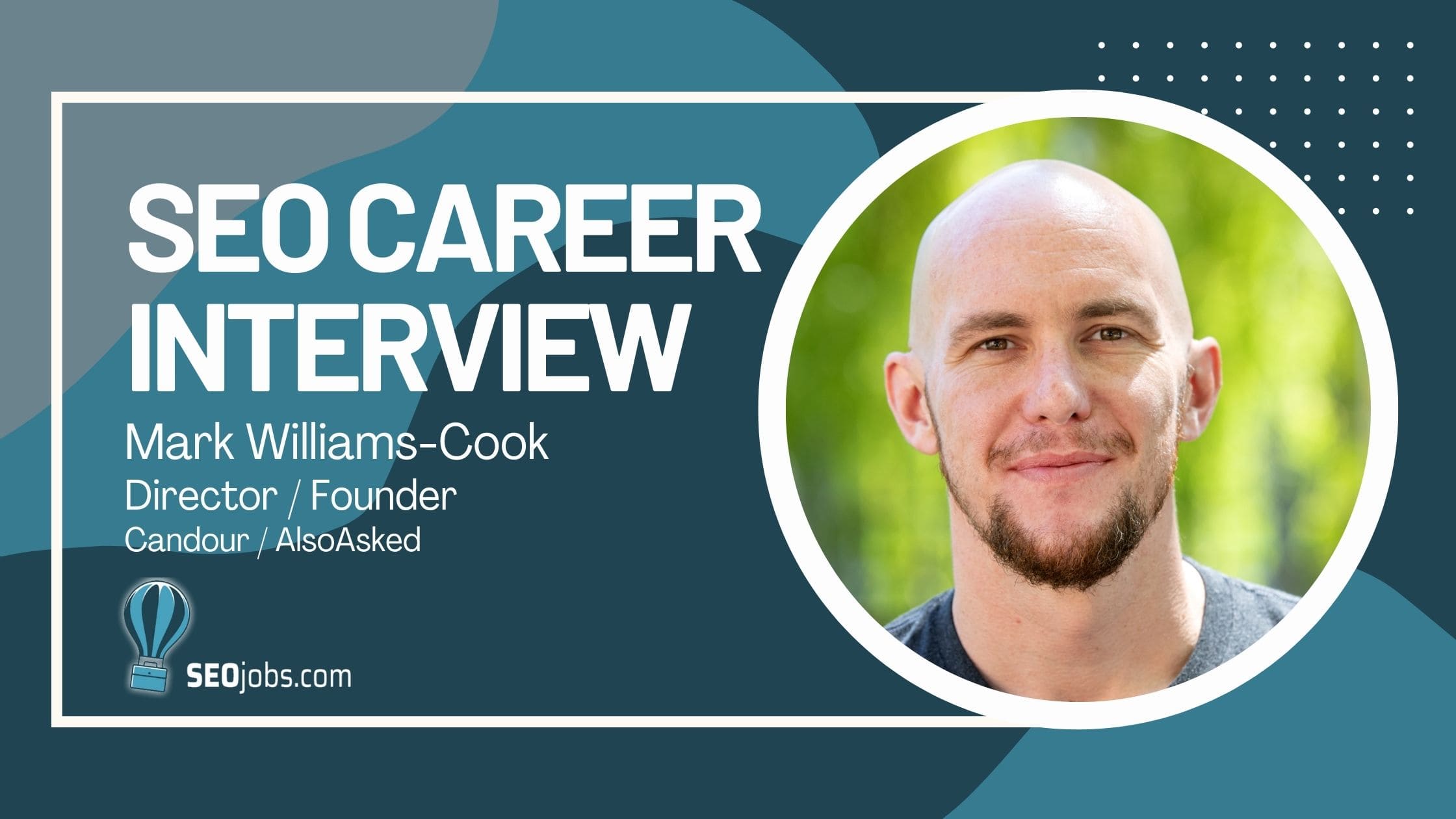Hi! 👋 We’re so glad to feature you on SEOjobs.com. Please introduce yourself to our site’s readers.
My name’s Mark Williams-Cook (Twitter | LinkedIn) and I’m currently a director at Candour, a digital agency based in Norwich, UK, Founder of intent research tool AlsoAsked.com and co-owner of an e-commerce business in the pet industry. I’ve been involved in the SEO industry for over 20 years, with 17 of those being agency-side.
Please share with us your current SEO role and for what company you work for.
I’m currently one of two directors at Candour and I oversee everything we do in terms of SEO, as well as being the primary representative for the agency in the industry.
We’ve got a really strong management team in place, so my involvement in client SEO work is usually at the strategic level. I help the team work out which approach is going to work best for the client and make sure they are all empowered to deliver it from a people and technology perspective. This means I do get to dive in and out of interesting projects, yesterday I was building a custom scraper to help our digital PR team with a story and before that, I was planning out team training with our Head of Marketing. I still get to be involved in the detail for the more complex technical pieces of work we do, this tends to be things like site migrations or consulting on some of the trickier technology setups we get to work with.
My work within the industry is primarily anchored around the Search with Candour podcast that I wrote, edited, produced and published for over a year before joining forces with Jack Chambers-Ward on our team who now leads this. I also run our SEO training sessions and have produced one of the top-rated Udemy SEO courses for smaller businesses and individuals who maybe don’t have the finances to invest in bespoke training.
AlsoAsked is still a very lean setup, I work closely with a small design and development team, and I’m in charge of product development, marketing and supporting our customers. I also split my time between some content sites that Candour operates and an e-commerce business where I am responsible for the digital marketing aspect and our co-owners do the logistics and customer support.
Can you share with us how you entered the SEO industry?
I think like many people that have been in the SEO industry for as long as me, it was more “stumbled in” than a chosen profession! I started building websites aged 14 and at around 17 years old I made a website with a friend that was designed to promote gigs and bands in my hometown. This site went through some iterations and slowly became a local music community site built around an active forum. In the early 2000s, setting up a forum was nowhere near as quick and easy as a similar job would be now and for this reason, I was offering to host sub-forums for local bands within our main forum for free. I knew nothing about SEO at the time, or that all of those bands linking to their forum on my site were doing me some great favours in Google!
A friend of mine had set the latest version of the site up in a system called phpNuke, which had a module to put an Amazon affiliate store within your own site. I had asked visitors of the site, that if they were going to buy something on Amazon to try and do it through our site so we could use the money to promote gigs. One day, out of the blue, I started earning £60 a day from my Amazon store consistently! Very confused, we dug through our AWstats and Amazon to discover that we ranked #1 in Google for a specific DVD player search term (above Amazon itself) and were generating sales.
This really piqued my curiosity – how did search engines ‘decide’ to rank my site above all the others?
How did you start to learn SEO? What are you currently doing to keep up with the ever changing SEO industry?
The learning landscape has changed dramatically, mostly for the better. When I started, the vast majority of SEO information was shared via forums like Sitepoint, DigitalPoint and BlackHatWorld. Outside of general SEO discussion, some of the highest quality information was available on personal blogs. Eli from BlueHat SEO, Dave Naylor (now Bronco), and the late Russ Jones and Bill Slawski who ran The Google Cache and SEO by the Sea respectively were some of my favourites.
Now, we’re spoiled for choice when it comes to learning SEO! If you’re just starting out, we’ve got excellent conferences like BrightonSEO, which include on-site training or you can opt for online courses like Blue Array Academy or even the one I put on Udemy!
In my opinion, once you’re past the basics, that’s when SEO starts to get really interesting as there is a lot of nuance and context to working out what the best thing to do it is – hence the running “it depends” joke.
I’m a big fan of “learning public” and doing is a great way to learn. For many years, I kept a blog called Digerati Marketing where I shared my successes building affiliate sites, making programs to game YouTube (resulting in 90M views and becoming one of their first partners) and of course, Google Adsense.
Apart from actually doing SEO, the three things I think you need to do to stay up to date are:
- Keep a constant stream of information coming in. Podcasts are a really good way to do this and keep up to date with a curated news stream
- Talking about these ideas with peers can really help your understanding and ironing the bugs in your thinking out! Twitter is still the primary place that I see SEOs coming together and talking, although there is a fractured Mastodon community.
- Test! Outside of actually doing SEO, it’s possible to setup your own very specific SEO tests which can help you understand how things work and try out new ideas. Sometimes you’ll find that accepted information is sometimes wrong!
A few more recent resources I like to point people to are:
- Aleyda’s SEOFOMO newsletter and LearningSEO.io
- Majestic’s SEO in 2023 book, podcast and video series
- Wix is also doing a really good job building a Learning SEO hub
Can you share what factors are most important to you in an SEO career and why? When do you know its time for a new job? Do these same factors play a role?
For me, the most important aspects of an SEO career are autonomy, flexibility and challenge. I highly value being able to maintain a good work/life balance and being empowered to say ‘no’ to work or organisations that I fundamentally don’t agree with. Challenge is what keeps me interested, there is always a new problem to solve or a way to improve an existing solution in SEO.
If I was giving advice to someone about factors they should look for in a career, it would first be for them to better understand themselves and what makes them happy. I’ve witnessed many people over the years chasing higher salaries, better job titles, or places at bigger organisations only to end up unhappy ultimately.
If I was starting out again, I would try and find an organisation that clearly commits to staff development, whether it is training, conferences or simply being around smart people that are given the opportunity to help you learn. It’s critical not to get stuck in a place that is clipping your wings to keep you in your current position, on your current salary – it happens a lot!
Once you’ve got some experience, the variation in salary will be substantial. I would generally think about what I want in terms of remote work, office-based work and travel, then look at the salaries available, rather than the other way around. Even in the UK, benefits like private healthcare can make a huge difference as it has become harder to get NHS treatment and private can be very expensive.
At the more senior levels, I’ve always seen a fork in the road. You can land some senior positions at huge organisations with great salaries, or you join smaller organisations and leverage your experience for equity. Personally, I have always preferred the latter; in my opinion, it’s slightly higher risk, but more potential reward and you’ll generally get more power to effect change.
What recommendations would you give to someone who is looking to join the SEO industry and get their first full-time SEO position?
Carl Hendy has written an excellent guide to getting a job in the SEO industry with no experience (he promises to update soon), which I think is full of excellent advice.
The great thing about SEO is the barrier to entry is so low. It’s very easy to setup your own Wix, WordPress or Shopify site to get hands-on experience. If you can go for any job interview and show some rankings you’ve achieved, some actual experience using a few popular content management systems and know your way around Google Analytics, you’ll be off to a great start!
On top of this, many tools such as Screaming Frog, Sitebulb, AlsoAsked and KeywordInsights offer demo, freemium or incredibly cheap trial access, so it’s worth becoming familiar with and having a working knowledge of these tools.
In my experience, the SEO field is normally an “employee market”, meaning there are more employers looking for good SEOs than vice-versa. While it may seem intimidating, joining in conversations and asking questions within the community on social media can be a great way to meet potential employers and people that can recommend you.
Over the last few years, we’ve also seen the development of some fantastic groups such as Women In Tech SEO and the Freelance Coalition of Developing Countries that have community mentoring, training and support networks. I’ve seen many success stories come from these groups as they offer support to paths less trodden within the industry.

